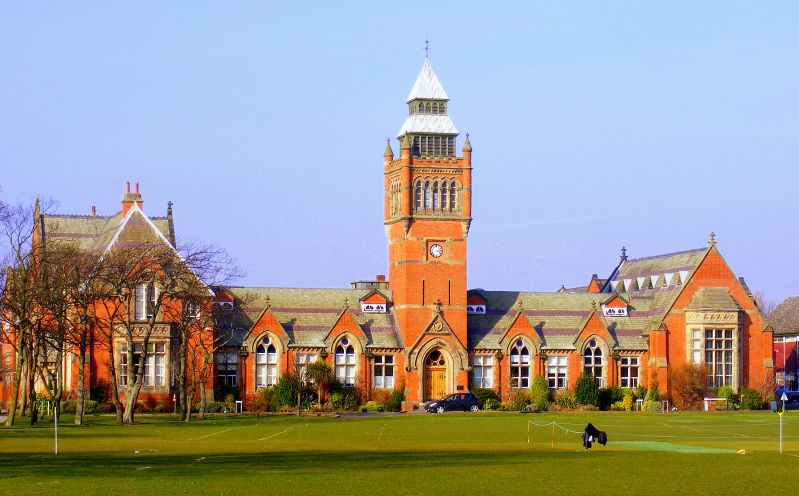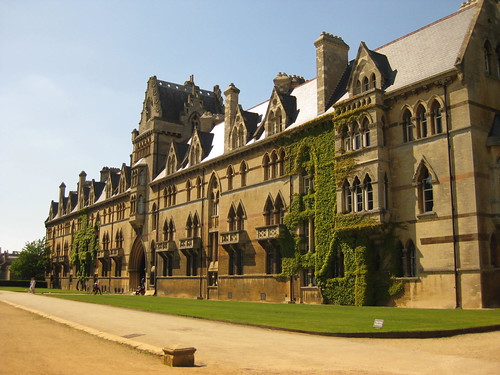Early development
John Spenser was born in 1558/9 in Suffolk, the son of John Spenser, gentleman. When we has twelve he attended Merchant Taylors' School in London, 1571. We get an insight into the high standard of classical education pursued by the Company where they imposed a frequent test (“probation”) on staff and pupils alike in 1606, in the attempt to make it one of the great schools of England:
flickr.com
During the probation, the headmaster was required to open his copy of Cicero at random and read out a passage to the Sixth form. The boys had to copy the passage from [Latin] dictation and then translate it, first into English, then into Greek and then into Latin verse. After this, they had to write a passage of Latin and some verses on some topic chosen for the day. This was for the morning; in the afternoon the process was repeated in Greek, based on the Greek Testament, Aesop's Fables, "or some other very easie Greeke author". The standard in Greek was not as high as in Latin, but Hebrew was also taught. This form of inspection was the model for teaching every day, as neither mathematics nor science were included in the curriculum.
Graduate education
From Merchant Taylors' Spencer ‘went up‘ to Corpus Christi College, Oxford, and graduated in Classics late 1577. He was the fellow-student and close friend and colleague of the celebrated author Richard Hooker - just as was his fellow students Hadrian Saravia, Sir Henry Savile, and John Reynolds.
Some indication of Spencer’s linguistic talent is shown in the fact that, despite lacking a master's degree, Spenser was elected by the president and seniors to the post of Greek reader the very next year,in 1578. The college has maintained its reputation as specializing and excelling in Classics, not least because of the emphasis placed on Greek and Latin culture since its founding. It is said to take more students to a study program inclusive of Classics each year, than of any other subject. From its early days the College became a humanist enterprise, and the library, founded at the same time as the college, was 'probably, when completed, the largest and best furnished library then in Europe.'
The three ancient languagesflickr.com
Spencer’s election was strongly opposed by Dr. Reynolds, as he felt Spencer’s sister had exercised undue influence in the appointment. The lady was married to the college President, who naturally had a critical role in all academic appointments! (but Also Spencer was only nineteen years old. Thus, “the unprecedented promotion aroused sharp resentment among older and better qualified fellows.” (1) Rainolds’ opposition may have also been caused by his knowledge that the young scholar had early attached himself to the anti-Puritan faction of the College who were as unhappy with the growing Puritan emphasis as they had been with Popery. The appointment was however confirmed and in 1579, Spencer became a Fellow of the College. and ‘took orders.’(McClure)
Preaching and further study
John Spencer was Greek reader for ten years, until resigning in 1588. He then left Oxford and held successively the livings of Aveley, Essex (1589–1592), Ardleigh, Essex (1592–1594), Faversham, Kent (1594–1599), and St Sepulchre-without-Newgate London (1599–1614). He was also ‘presented’ to the living of Broxbourne, Hertfordshire, in 1592.During these years Spencer was not idle academically, as he developed his theological interests. In 1590 he took a BTh, and his consolidated learning was acknowledged with a doctorate, awarded 1602. During this time he also became a popular preacher.
Spencer’s flowing style carried figures of speech to great lengths. In his sermon to St. Paul’s Cross, “God’s love to His Vineyard,” he elaborated on the comparison of the Church to a vine rooted in Christ, warning the church in elaborate metaphors which ranged from horticulture to climate, from fencing to irrigation.”(2)
Spencer’s sermons were reputed to have ‘a more formal sober and gracious elegance, sometimes falling into excess of wit’ (MacClure, 164). This contrasted with the more colloquial style preferred by Elizabethan puritans.
Academic achievements
In 1607 Spencer was appointed president of Corpus Christi College, Oxford in succession to John Rainolds. The time of his presidency was apparently orderly, peaceful and uneventful. He was made a chaplain-in-ordinary to King James.
Spenser was married to George Cranmer's sister, herself a favourite pupil of Richard Hooker. His wife’s brothers, George and William Cranmer were warm patrons of their celebrated teacher; both brothers were in diplomatic service to the Court. Hooker authored the work well-known among Anglicans, “The Laws of Ecclesiastical Polity.” Spencer was constantly consulted, says McClure, in the making of this work, and was even said to have “had a special hand” as in part its author. According to Hamlett Marshall, one of Spencer’s friends,
This of mine own knowledge I dare affirm, that such was his humility and modesty that when he had taken extraordinary pains . . about compiling a learned and profitable work [the Laws] now extant, yet would he not put his hand to it, though he had a hand in it. Therefore it fell out that another took his honours.(3)McClure gives us some insight into how more radical Puritans like Thomas Cartwright, (who influenced John Rainolds) would have viewed Hooker‘s theology as arbitrary and arrogant:
. . . . [T]his work is to this day the “great gun” on the ramparts of the Episcopal sect. Its argument, however, is very easily disposed of. It is thus described by Dr. James Bennett; --”The architecture of the fabric resembles Dagon’s temple; for it rests mainly upon two grand pillars, which, so long as they continue sound, will support all its weight. The first is, ‘that the Church of Christ, like all other societies, has power to make laws for its well-being;’ and the second, that ‘where the sacred Scriptures are silent, human authority may interpose.’ But if some Samson can be found to shake these pillars from their base, the whole edifice, with the lords of the Philistines in their seats, and the multitude with which it is crowded, will be involved in one common ruin. Grant Mr. Hooker these two principles, and his arguments cannot be confuted. But if a Puritan can show that the Church of Christ is different from all civil societies, because Christ had framed a constitution for it, and that where the Scriptures are silent, and neither enjoin nor forbid, no human association has a right to interpose its authority, but should leave the matter indifferent; in such a case, Hooker’s system would not be more stable than that of the Eastern philosopher, who rested the earth on the back of an elephant, who stood upon a huge tortoise, which stood upon nothing.”
After the death of Richard Hooker in 1600 Spencer edited the first five books of the Ecclesiastical Politie (London, 1604). When Spenser wrote his preface, he identified with Hooker’s views, noting ‘this unhappy controversy about the received ceremonies and discipline of the church of England’ which had ‘rent the body of the church into divers parts, and divided her people into divers sects’, and had ‘taught the sheep to despise their pastors, and alienated the pastors from the love of their flocks.’
Richard Hooker, Exeterflickr.com
The introduction to that work and A Sermon at Paule's Crosse on Esay V., 2, 3 (London, 1615) are his only published writings. John Keble, former Professor of Poetry at Oxford, says, that it is “full of eloquence, and striking thoughts.”
Translation involvement
Spencer was also one of the translators of the King James Bible, serving on the second Westminster group of seven, led by William Barlow. They worked mainly on the epistles of St Paul - from Romans to Jude, inclusive. During the five years in which the translation process occurred, Spencer was vicar of St. Sepulchre-without-Newgate London. This made him proximate to the Jerusalem chamber, Westminster. Thus, it was an easy journey for him to make to attend regular meetings of the team. There each read his latest draft-translation to the rest, as an agreed basis for detailed discussion, amendment and review.
The end of a career.
One final appointment followed the publication of the Authorised Version. The following year Spencer was ‘collated to’ the prebend of Ealdstreet, in St Paul's Cathedral. Two years afterwards, he died aged fifty-five in 1614, and was buried in the chapel of Corpus Christi College. A monument to his memory stands next to one of his predecessor, ‘each being attired in his doctor's habits, and each holding a book, Reynolds a closed one, Spenser an open one’ (Fowler, 175). His death apparently distressed his widow and children, who doubtless expected many more years together. (1)
Corpus Christi College, Oxfordflickr.com
1. Wright, Stephen (2004) ‘Spenser, John (1558/9–1614)’, Oxford Dictionary of National Biography, Oxford University Press, 2004; online edn, Jan 2008
2. Paine, Gustavus, (1959/1977)The men behind the King James version, MI: Bakerp. 44 (3) Bobrick, Benson. (2001) The Making of the English Bible Lon: Weidenfeld & Nicolson, p. 244




No comments:
Post a Comment